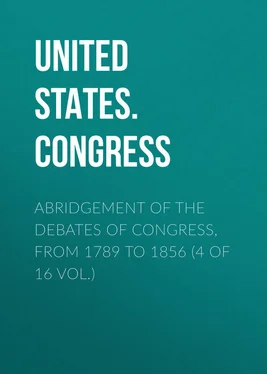United States. Congress - Abridgement of the Debates of Congress, from 1789 to 1856 (4 of 16 vol.)
Здесь есть возможность читать онлайн «United States. Congress - Abridgement of the Debates of Congress, from 1789 to 1856 (4 of 16 vol.)» — ознакомительный отрывок электронной книги совершенно бесплатно, а после прочтения отрывка купить полную версию. В некоторых случаях можно слушать аудио, скачать через торрент в формате fb2 и присутствует краткое содержание. Жанр: Политика, foreign_edu, на английском языке. Описание произведения, (предисловие) а так же отзывы посетителей доступны на портале библиотеки ЛибКат.
- Название:Abridgement of the Debates of Congress, from 1789 to 1856 (4 of 16 vol.)
- Автор:
- Жанр:
- Год:неизвестен
- ISBN:нет данных
- Рейтинг книги:3 / 5. Голосов: 1
-
Избранное:Добавить в избранное
- Отзывы:
-
Ваша оценка:
- 60
- 1
- 2
- 3
- 4
- 5
Abridgement of the Debates of Congress, from 1789 to 1856 (4 of 16 vol.): краткое содержание, описание и аннотация
Предлагаем к чтению аннотацию, описание, краткое содержание или предисловие (зависит от того, что написал сам автор книги «Abridgement of the Debates of Congress, from 1789 to 1856 (4 of 16 vol.)»). Если вы не нашли необходимую информацию о книге — напишите в комментариях, мы постараемся отыскать её.
Abridgement of the Debates of Congress, from 1789 to 1856 (4 of 16 vol.) — читать онлайн ознакомительный отрывок
Ниже представлен текст книги, разбитый по страницам. Система сохранения места последней прочитанной страницы, позволяет с удобством читать онлайн бесплатно книгу «Abridgement of the Debates of Congress, from 1789 to 1856 (4 of 16 vol.)», без необходимости каждый раз заново искать на чём Вы остановились. Поставьте закладку, и сможете в любой момент перейти на страницу, на которой закончили чтение.
Интервал:
Закладка:
I now come to the year 1806, an eventful year to the foreign commerce of our people. An extravagant and armed trade had for a considerable time been carried on by some of our citizens with the emancipated or revolted blacks of Hayti. The French Minister, conformably to the instructions of his Government, remonstrated against this traffic as ungracious and improper; and under an impression that our citizens ought to be restrained from intercourse with the negroes of Hispaniola, Congress passed an act forbidding that altogether. This was the second time that our Government circumscribed the commercial conduct of its citizens. It was also during this year that memorials were forwarded to the Executive and legislative branches of our Government by the merchants of our principal seaports, stating the vexations of their foreign commerce to be intolerable, and calling in the most earnest terms for relief or redress. These addresses were mostly composed with great ability; it seemed as if the merchants were in danger of total ruin. Their situation was depicted as being deplorable in the extreme. The interposition of their Government was asked in the most strenuous and pressing terms; and your table, Mr. President, was literally loaded with petitions. The chief cause of this distress was briefly this: These citizens of the United States were engaged during the war in Europe, in a commerce with enemies' colonies not open in time of peace; by this means, the produce of the French West Indies was conveyed under the neutral flag to the mother country. Great Britain opposed the direct commerce from the colony to France through the neutral bottom. The neutral then evaded the attempt against him by landing the colonial produce in his own country, and after having thus neutralized or naturalized it, exported it under drawback for Bordeaux or Marseilles; this proceeding was also opposed by the British, and much property was captured and condemned in executing their orders against it. Their writers justified their conduct by charging fraud upon the neutral flag, and declaring that under cover of them a "war in disguise" was carried on, while on our side the rights of neutrals were defended with great learning and ability in a most profound investigation of the subject.
This same year was ushered in by a proclamation of General Ferrand, the French commandant at St. Domingo, imposing vexations on the trade of our citizens; and a partial non-importation law was enacted against Great Britain by Congress about the middle of April. But these were not all the impediments which arose. Notices were given to the American Minister in London of several blockades. The chief of these was that of the coast, from the Elbe to Brest inclusive, in May. And here, as it occurs to me, may I mention the spurious blockade of Curaçoa, under which numerous captures were made. And lastly, to complete the catalogue of disasters for 1806, and to close the woful climax, the French decree of Berlin came forth in November, and, as if sporting with the interests and feelings of Americans, proclaimed Great Britain and her progeny of isles to be in a state of blockade.
Hopes had been entertained that such a violent and convulsed condition of society would not be of long duration. Experience, however, soon proved that the infuriate rage of man was as yet unsatisfied, and had much greater lengths to go. For early in the succeeding year (1807), an order of the British Council was issued, by which the trade of neutrals, and of course of American citizens, was interdicted from the port of one belligerent to the port of another. And in the ensuing May, the rivers Elbe, Weser, and Ems, with the interjacent coasts were declared by them to be in a state of blockade, and a similar declaration was made on their part to neutrals in regard to the straits of the Dardanelles and the city of Smyrna. But these were but subordinate incidents in this commercial drama; the catastrophe of the tragedy was soon to be developed. "On the 22d of June, by a formal order from a British Admiral, our frigate Chesapeake, leaving her port for a distant service, was attacked by one of these vessels, which had been lying in our harbors under the indulgence of hospitality, was disabled from proceeding, had several of her crew killed, and four taken away." Immediately the President by proclamation interdicted our harbors and waters to all British armed vessels, and forbade intercourse with them. Under an uncertainty how far hostilities were intended, and the town of Norfolk being threatened with an immediate attack, a sufficient force was ordered for the protection of that place, and such other preparations commenced and pursued as the prospect rendered proper.
In furtherance of these schemes, a proclamation was published, holding all their absent seamen to their allegiance, recalling them from foreign services, and denouncing heavy penalties for disobedience. The operation of this upon the American merchant service would have been very sensibly felt. Many British born subjects were in the employ of our merchants, and that very Government, which claimed as a British subject every American citizen who had been but two years a seaman in their service, refused to be bound by their own rule in relation to British subjects who had served an equal term on board the ships of the United States. But this was not all. The month of November was distinguished by an order retaliating on France a decree passed by her some time before, declaring the sale of ships by belligerents to be illegal; and thus, by virtue of concurrent acts of these implacable enemies, the poor neutral found it impossible to purchase a ship either from a subject of Great Britain or of France. That season of gloom was famous, or rather infamous, for another act prohibiting wholly the commerce of neutrals with the enemies of Great Britain, and for yet another, pregnant with the principles of lordly domination on their part, and of colonial vassalage on our, by which the citizens of these independent and sovereign States are compelled to pay duties on their cargoes in British ports, and receive licenses under the authority of that Government, as a condition of being permitted to trade to any part of Europe in possession of her enemies.
This outrageous edict on the part of Britain was succeeded by another on the side of France, equalling, or if possible, surpassing it in injustice. In December came forth the decree of Milan, enforcing the decree of Berlin against American trade; dooming to confiscation every vessel of the United States that had been boarded or even spoken to by a Briton, and encouraging, by the most unjustifiable lures, passengers and sailors to turn informers. The abominable mandate was quickly echoed in Spain, and sanctioned by the approbation of His Most Catholic Majesty. It has been executed with shocking atrocity. In addition to other calamities, the property of neutrals has been sequestered in France, and their ships burned by her cruisers on the ocean.
Such, Mr. President, was the situation of the European world, when Congress deemed it necessary to declare an embargo on our own vessels. Denmark and Prussia, and Russia, and Portugal, had become associated or allied with France; and, with the exception of Sweden, the commerce of our citizens was prohibited, by the mutually vindictive and retaliating belligerents, from the White Sea to the Adriatic. American ships and cargoes were declared the prize and plunder of the contending powers. The widely-extended commerce of our people was to be crushed to atoms between the two mighty millstones, or prudently withdrawn from its dangerous exposure, and detained in safety at home. Policy and prudence dictated the latter measure. And as the ocean was become the scene of political storm and tempest, more dreadful than had ever agitated the physical elements, our citizens were admonished to partake of that security for their persons and property, in the peaceful havens of their country, which they sought in vain on the high seas and in European harbors. The regulations, so destructive to our commerce, were not enacted by us. They were imposed upon us by foreign tyrants. Congress had no volition to vote upon the question. In the shipwreck of our trade, all that remained for us to do, was to save as much as we could from perishing, and as far as our efforts would go, to prevent a total loss.
Читать дальшеИнтервал:
Закладка:
Похожие книги на «Abridgement of the Debates of Congress, from 1789 to 1856 (4 of 16 vol.)»
Представляем Вашему вниманию похожие книги на «Abridgement of the Debates of Congress, from 1789 to 1856 (4 of 16 vol.)» списком для выбора. Мы отобрали схожую по названию и смыслу литературу в надежде предоставить читателям больше вариантов отыскать новые, интересные, ещё непрочитанные произведения.
Обсуждение, отзывы о книге «Abridgement of the Debates of Congress, from 1789 to 1856 (4 of 16 vol.)» и просто собственные мнения читателей. Оставьте ваши комментарии, напишите, что Вы думаете о произведении, его смысле или главных героях. Укажите что конкретно понравилось, а что нет, и почему Вы так считаете.












